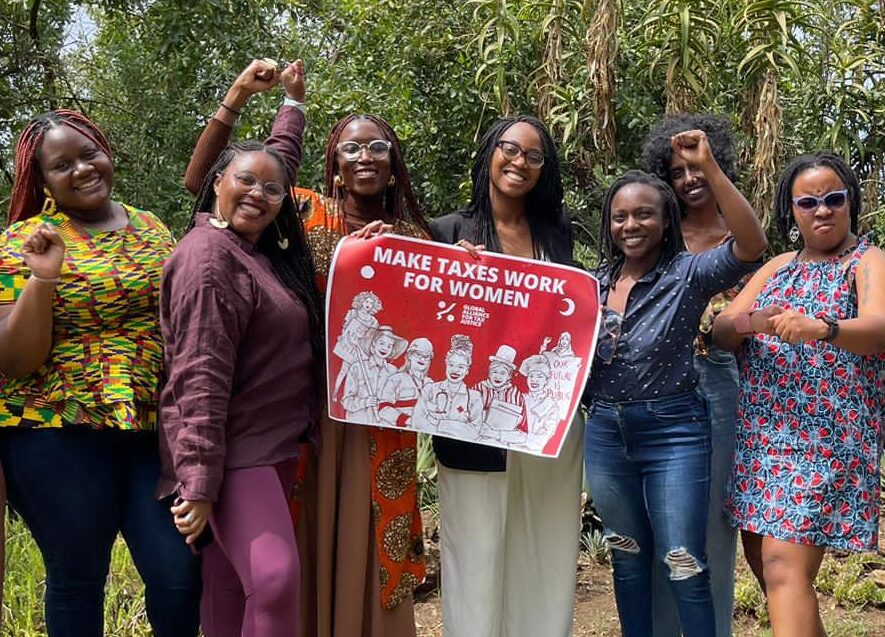08 March 2024 – On this International Women’s Day, GATJ’s Tax and Gender Working Group calls for the adoption of gender-transformative tax systems that contribute to a more equitable, sustainable and just social organisation of care that upholds women’s rights.
The essence of care lies in fulfilling basic needs and fostering social cohesion, serving as the backbone of societies. However, at both national and international levels, the current financial and taxation systems falter in providing the requisite financial resources to meet society’s care needs while perpetuating gender inequalities.
Globally, domestic tax systems have been hampered by falling top rates, inadequate taxation of wealth and capital gains, and an overreliance on indirect tax measures such as consumption taxes. At the same time, an ineffective international tax architecture – reinforced by the establishment of a secrecy industry that evades the regulatory capacity of individual governments – has continued to enable the proliferation of large-scale tax avoidance and tax evasion.
These developments have severely undermined states’ revenue collection and their capacity for redistribution to address societal inequalities. Consequently, funding for public services and infrastructure, vital for redistributing the unequal burden of care predominantly borne by women and girls, has dwindled, especially in the Global South where formal social care systems are virtually non-existent. This has had grave implications for women and girls.
For example, in the absence of publicly-provided health-care, child-care, and elderly-care services, for example, it is predominantly women who fill in the gap, providing these essential services often without remuneration. Women are also overrepresented among formal and informal care providers, a segment of the workforce that tends to be underpaid, exposed to unsafe working conditions and without social benefits.
The intricate relationship between taxation, public services, care and gender underscores tax justice as a critical dimension within the realm of women’s rights. Governments’ obligations to secure public finances as a central component of fulfilling women’s rights commitments are recognized in international human rights and development frameworks such as the International Covenant on Economic Social and Cultural Rights (ICESCR), the Convention on the Elimination of all Forms of Discrimination Against Women (CEDAW), the 2030 Agenda for Sustainable Development Goals (SDGs), and the Addis Ababa Agenda for Action.
In addition, ensuring tax revenues effectively contribute to financing for public care systems has been central to the advocacy of GATJ’s Tax and Gender Working Group (TGWG), epitomised in the 2017 Bogotá Declaration of Tax Justice for Women’s Rights and the movement-led Rebuilding the Social Organisation of Care Manifesto.
On this International Women’s Day, the TGWG joins allies in the gender equality, women’s rights and feminist movements in calling governments to take all appropriate measures to respect, protect and advance women’s rights globally. In particular, acknowledging the essential role that tax-funded public care systems play in guaranteeing the realisation of women’s rights, the TGWG calls on governments to:
- Recognize care work and women’s experiences in tax policy formulation;
- Prioritise progressive taxation for financing for gender-transformative public services;
- Eliminate the burden of regressive tax measures on formal and informal caregivers;
- Uphold tax transparency and accountability to curb illicit financial flows;
- Collaborate towards an inclusive and democratic global tax cooperation for a UN Tax Convention that contributes towards gender-justice.
These demands form the core of GATJ’s 8th annual Global Days of Action on Tax Justice for Women’s Rights, taking place between 18-22 March 2024 under the theme “Taxing Fairly for Gender-Transformative Care”. The campaign will unite the global tax justice community with women’s rights and feminist movements and organisations to raise the call for the adoption of gender-transformative tax systems that contribute to a more equitable, sustainable and just social organisation of care.
Learn more about the campaign and how to participate here!
